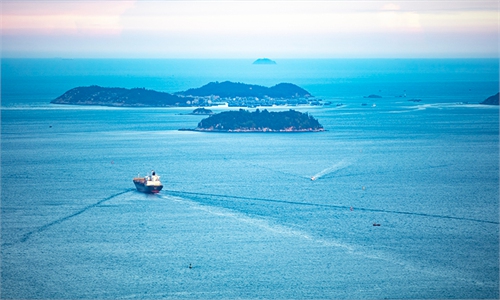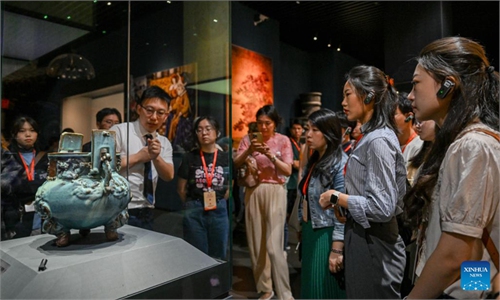Beijing urges Washington to stop official exchanges with Taiwan island
'Visit shows increasingly perplexed DPP authorities facing an uncertain US'

A view of the Taiwan Straits is seen from Xiamen port, in East China's Fujian Province. Photo: IC
China on Friday urged the US to stop official exchanges with China's Taiwan island and cease support for any form of "Taiwan independence" separatist activities, after senior officials from the island reportedly made a secret trip to the greater Washington area for talks with US officials recently.
China firmly opposes any forms of official exchange between the US and Taiwan. This position is consistent and clear, Foreign Ministry spokesperson Mao Ning said, urging the US to abide by the one-China principle and the three China-US joint communiqués, deliver on the commitments made by the US leaders on the issues related to Taiwan, handle the Taiwan-related issues with utmost prudence, and stop any official exchanges with Taiwan.
The US should stop upgrading its substantive relations with the region, and stop conniving at and supporting "Taiwan independence" separatist activities in any form, Mao said.
The head of the external affairs authority of Taiwan island, Lin Chia-lung and Joseph Wu, the security adviser to Lai Ching-te, travelled to the Washington area this week through a "special channel" to hold talks with the US, according to Financial Times, without naming the US officials.
"The visit by the two high-ranking officials to the US is significant at this particular juncture, and it is sensitive and contains secrets between the two sides," an analyst on Taiwan affairs, who preferred to be named Li, told the Global Times.
"Through deliberately analyzing and strategizing their next steps, the US and the DPP authorities are seeking to come up with something to further challenge the mainland without inciting a significant backlash from it," Li said.
He explained that the US' engagement with Taiwan is aimed at more effectively deploying its strategic maneuvers to contain the Chinese mainland, when the US is showing fatigue and weakness in dealing with both Asia-Pacific affairs and conflicts in Ukraine and the Middle East.
The US government is also attempting to engage with its protected parties, including the island, to reaffirm its commitments, dispelling any doubts about the US' promises and Taiwan authorities' confidence in US protection, Lü Xiang, a research fellow at the Chinese Academy of Social Sciences, told the Global Times on Friday.
"A US powerless in dealing with international affairs including the Ukraine crisis leaves Lai Ching-te increasingly perplexed, so can the chess piece of Taiwan still be supported in this circumstance?" Lü asked.
The visit serves to alleviate Lai's concerns, gauge their position within the US strategic landscape and seek to strengthen the so-called protection from the US, he said.
However, the fact is that collusion with the US, which views Taiwan as merely a chess piece, will only lead the island toward greater chaos, more intense internal strife, and a further loss of direction. The US has always maintained strategic ambiguity when it comes to "defending Taiwan," Li explained.
Despite the small move that the US and DPP authorities have made, the mainland will remain confident and methodical in its approach to dealing with the Taiwan question, Lü emphasized.
This year's government report showed that the mainland will implement the overall policy for the new era on resolving the Taiwan question, stay committed to the one-China principle and the 1992 Consensus, and resolutely oppose separatist activities and external interference. The mainland will promote the peaceful development of cross-Straits relations, and be firm in advancing the cause of China's reunification, according to the report.




